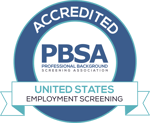%20copy.jpg)
Drug and Alcohol testing is utilized to create a safe and drug-free environment for employees and clients. But recently with marijuana legalization gaining popularity and various human rights movements, there can be confusion as to when to test, how to test, and the legality of testing. We’ve compiled a list of Frequently Asked Questions to alleviate any concerns you may have and to aid you when creating policies.
As a consumer reporting agency, we cannot act as your attorney or give you advice. This blog is not all encompassing. You must consult qualified legal counsel to ensure you are maintaining a compliant program.
Is pre-employment drug testing legal?
Pre-employment testing is common practice and legal in most jurisdictions. State legislation can vary from state to state, so you must do your homework to ensure you are compliant. It’s also important to keep up-to-date on legislation changes and trends.
Recently, legislation passed which prohibits New York City employers from testing job candidates for marijuana as a condition of employment. Exceptions exist for federal or state contract or grants and for safety and security sensitive jobs. Once the mayor signs the legislation, the law will take effect one year after enactment.
This example demonstrates how important it is to keep up-to-date on screening regulations to ensure your processes are compliant.
What are the common reasons for drug testing?
Pre-Employment, Periodic, Random, Reasonable Suspicion, Post Accident, and Annual Retention Testing.
What are the common testing methods?
Urine Testing (most common), Hair testing, and Oral Fluid Testing. There are many options when selecting drug testing including: DOT, 5-Panel, 10-Panel, 11 Panel, 12 Panel, 14 Panel, Alcohol and more!
Does Choice Screening provide drug testing?
Yes, we are partnered with three of the most experienced leaders in substance and alcohol abuse testing: LabCorp Solutions, Quest Diagnostics, and Alere eScreen. There are over 15,000 testing sites collectively, online scheduling, MRO service, and integration into our system to create fast turnarounds!
What is the drug and alcohol testing process?
The applicant or employee will go to a collection site to submit a specimen. The collection site performs initial testing to confirm the validity of the specimen. The specimen is then sent to a lab to be tested. Negative results are returned within a few days of specimen collection. Positive results are reviewed by a Medical Review Officer to confirm permissible use.
Which states have legalized marijuana?
The following states/federal district/territories have legalized marijuana in some form for recreational use:
· Alaska
· California
· Colorado
· District of Columbia
· Guam
· Maine
· Massachusetts
· Michigan
· Nevada
· Northern Mariana Islands
· Oregon
· Vermont
· Washington
The following states/federal district/territories have legalized marijuana in some form for medical use:
· Alabama
· Arizona
· Arkansas
· Connecticut
· Delaware
· Florida
· Georgia
· Hawaii
· Illinois
· Indiana
· Iowa
· Kansas
· Kentucky
· Louisiana
· Maryland
· Minnesota
· Mississippi
· Missouri
· Montana
· New Hampshire
· New Jersey
· New Mexico
· New York
· North Carolina
· North Dakota
· Ohio
· Oklahoma
· Pennsylvania
· Puerto Rico
· Rhode Island
· South Carolina
· Tennessee
· Texas
· U.S. Virgin Islands
· Utah
· Virginia
· West Virginia
· Wisconsin
· Wyoming
What are the drug and alcohol testing regulations by state?
*Please note that this list is for informational purposes only and does not include all states and territories. Be sure to consult with legal counsel prior to testing your applicants and employees.
ALABAMA: Alabama Code 25-5-330 to 25-5-340
ALASKA: Alaska Statutes 23.10.600 - 23.10.699
ARIZONA: Arizona Statute 23-493 TO 23-493.12
ARKANSAS: Arkansas SB773, ACT 1552 and Arkansas HB2646, ACT 1757
SAN FRANCISCO, CA: San Francisco, CA Police Code, Article 33A and San Francisco, CA Police Code, Article 40
BOULDER, CO: Boulder, CO Human Rights Code Title 12, Chapter 3
CONNETICUT: Connecticut Title 31, Chapter 557
FLORIDA: Florida Workers’ Compensation Code Section 440.10
GEORGIA: Georgia Code 34-9-410 to 421 and Georgia Code 33-99-40.2
HAWAII: Hawaii Revised Statute 329B-1-8
Hawaii Administrative Rules Title 11, Chapter 13
IDAHO: Idaho Code 72-1701 to 1716
ILLINOIS PUBLIC WORKS: Illinois Public Works Act 095-063
IOWA: Iowa Code 730.5 and Iowa Administrative Code Rule 641-12.1-12.21
KANSAS: Kansas Statute 65-1107 to 1108a and Kansas Statute 44-706
KENTUCKY: 803 KAR 25:280
LOUISANA: LAC 61:I.101 and Policy: Substance Abuse and Drug-Free Workplace
MAINE: Title 26, Chapter 7, Subchapter 3
MARYLAND: Maryland Regulations Code Title 10.10.10.01-.09
MINNESOTA: Minnesota Statute 181.950 TO 181.957
MISSISSIPPI: Mississippi Code Title 15, Part 3, Subpart 1
MONTANA: Montana Code 39-2-205-211
NEBRASKA: Nebraska Revised Statutes Chapter 48-1901 to 48-1910
NORTH CAROLINA: North Carolina Statute 95-230 to 95-235 and 13 NCAC 20.0101 to 0602
OHIO: Ohio Bureau of Workers’ Compensation
OKLAHOMA: Oklahoma Statute Title 40, Chapter 15 and Oklahoma Administrative Code Title 310, Chapter 638
OREGON: Oregon Revised Statute 438.435 and OAR 333-024-0305 to 333-024-0365
RHODE ISLAND: Rhode Island Title 28, 6.5.1 to 28-6.5-2
SOUTH CAROLINA: South Carolina Code of Laws 41-1-15 and South Carolina Code of Laws 38-73-500
TENNESSEE: Tennessee Chapter 0800-02-12
UTAH: UTAH CODE Chapter 38
VERMONT: Vermont Statute Title 21, Subchapter 11 and Vermont Statute Title 118, Chapter 86
WYOMING: Wyoming Workers’ Safety & Compensation Division: Chapter 1, and Chapter 10


